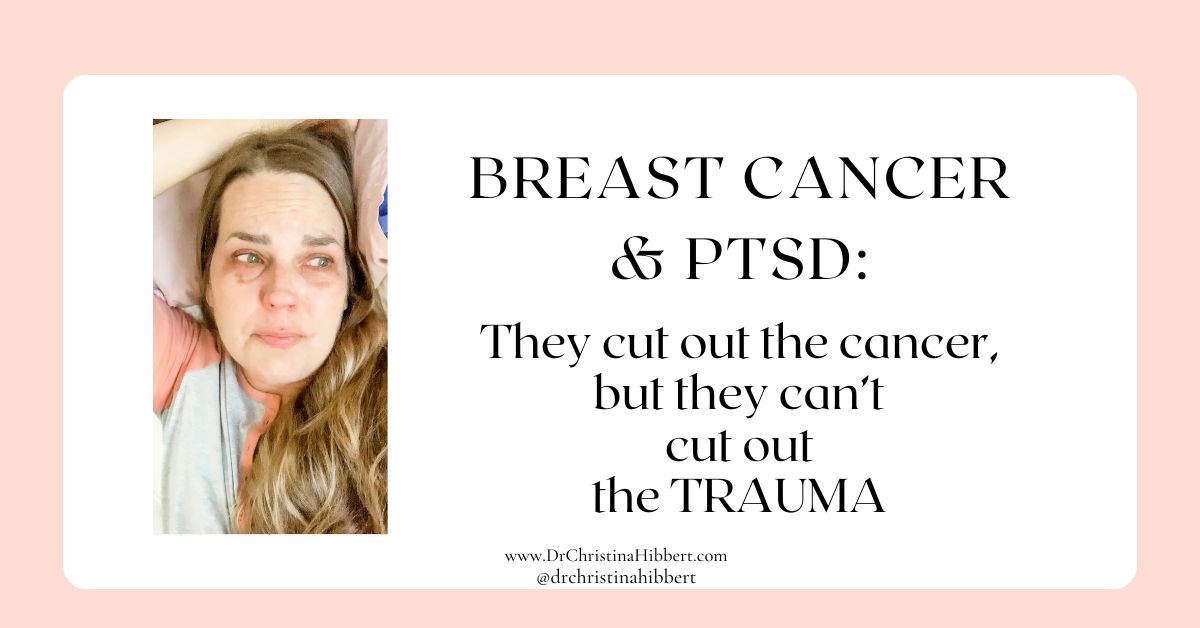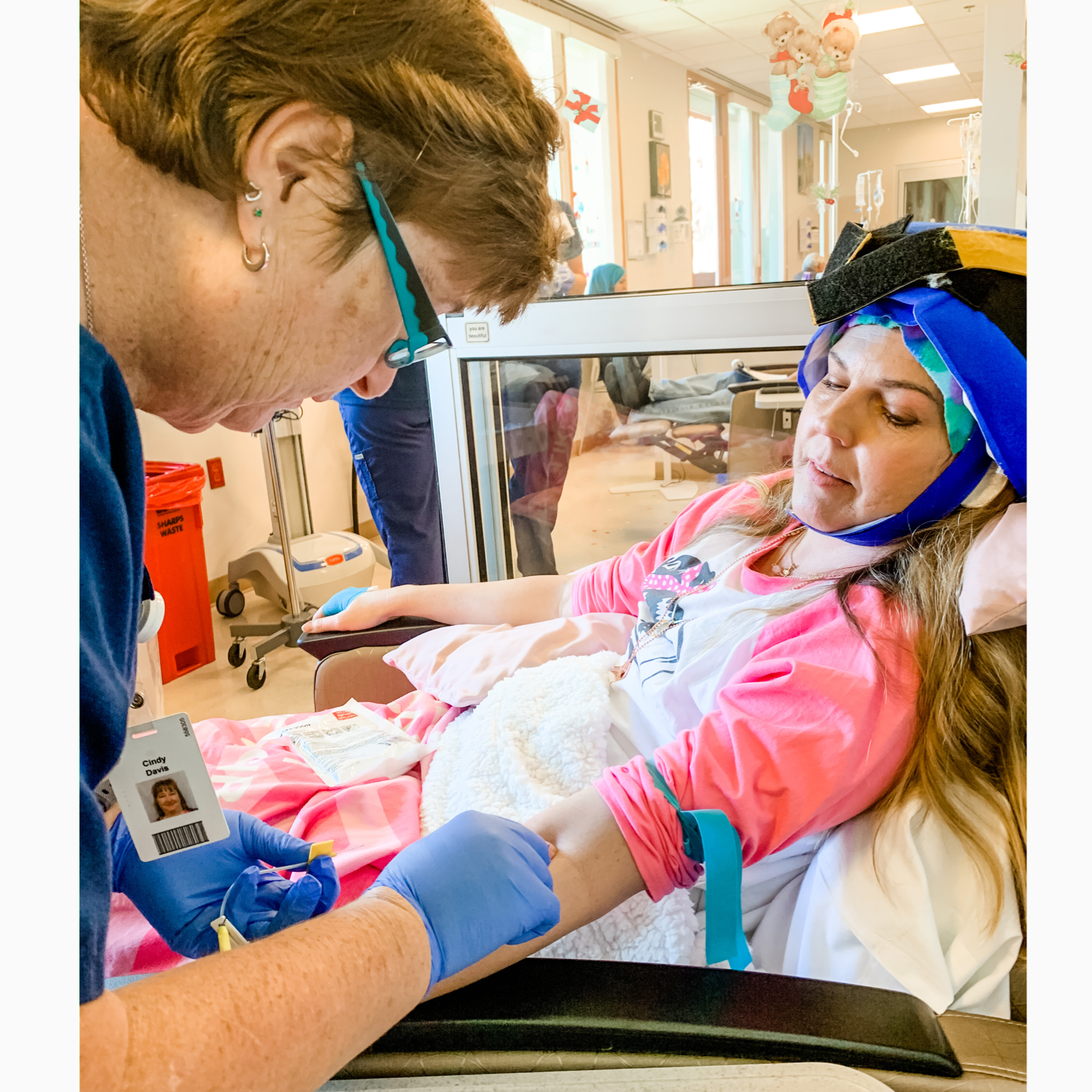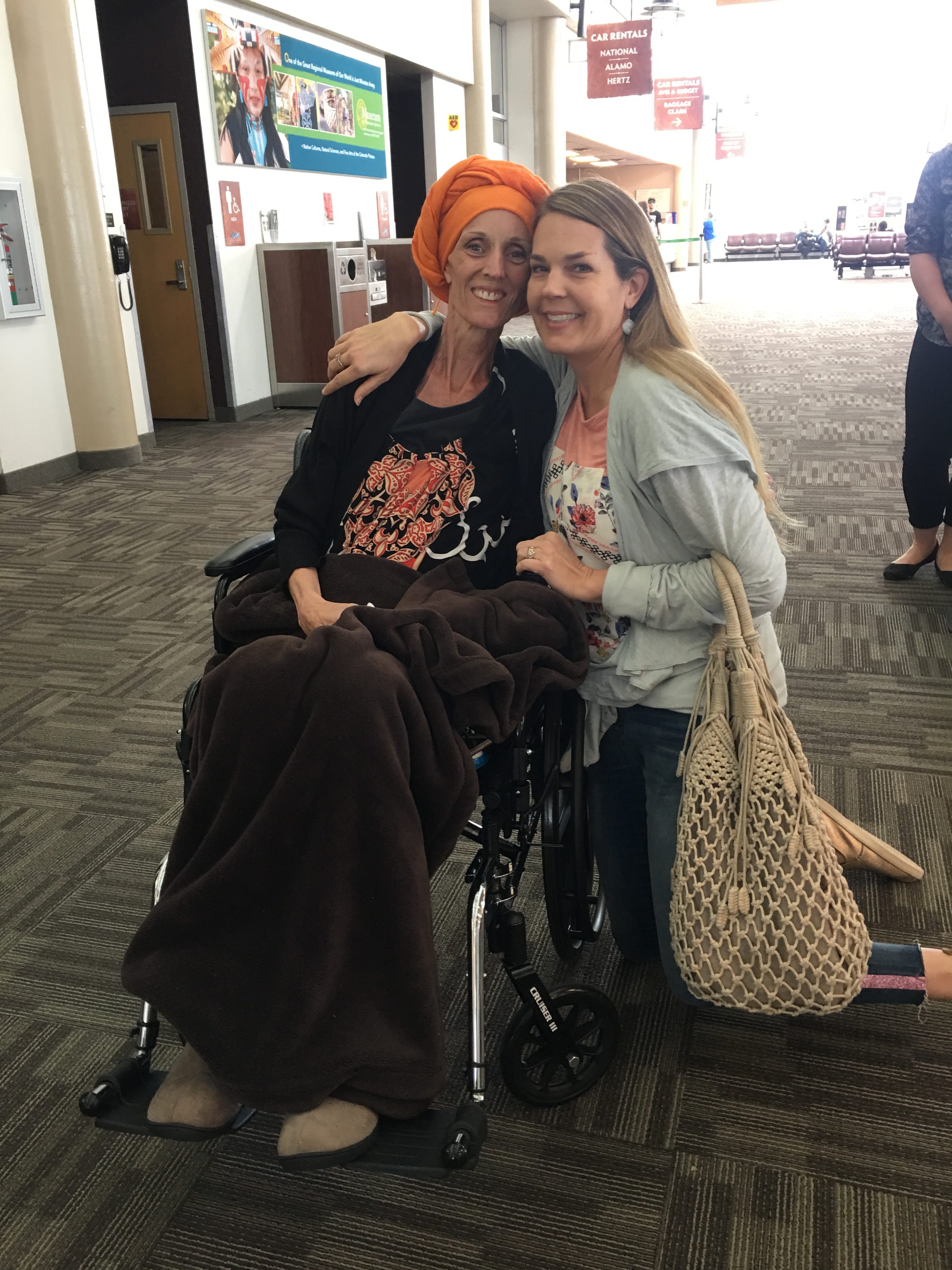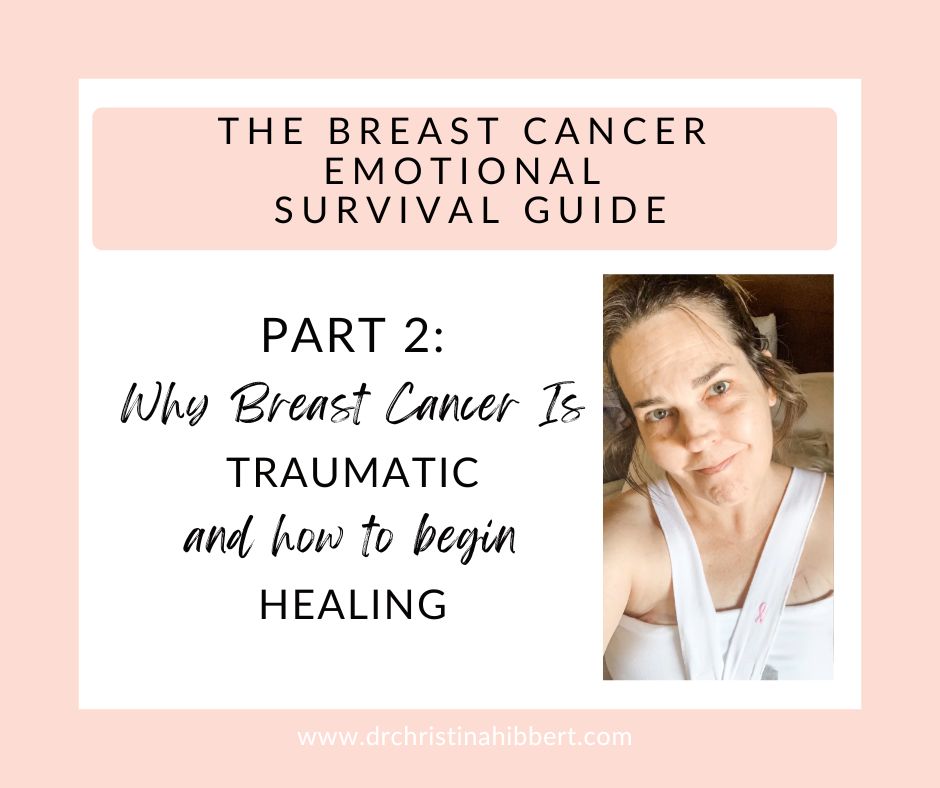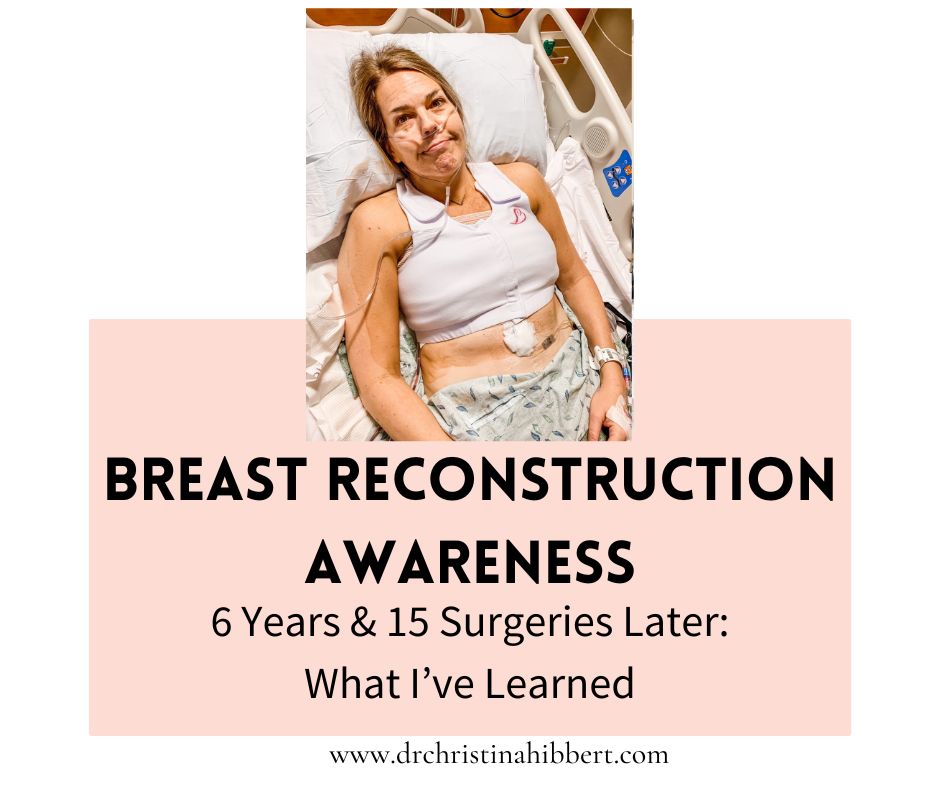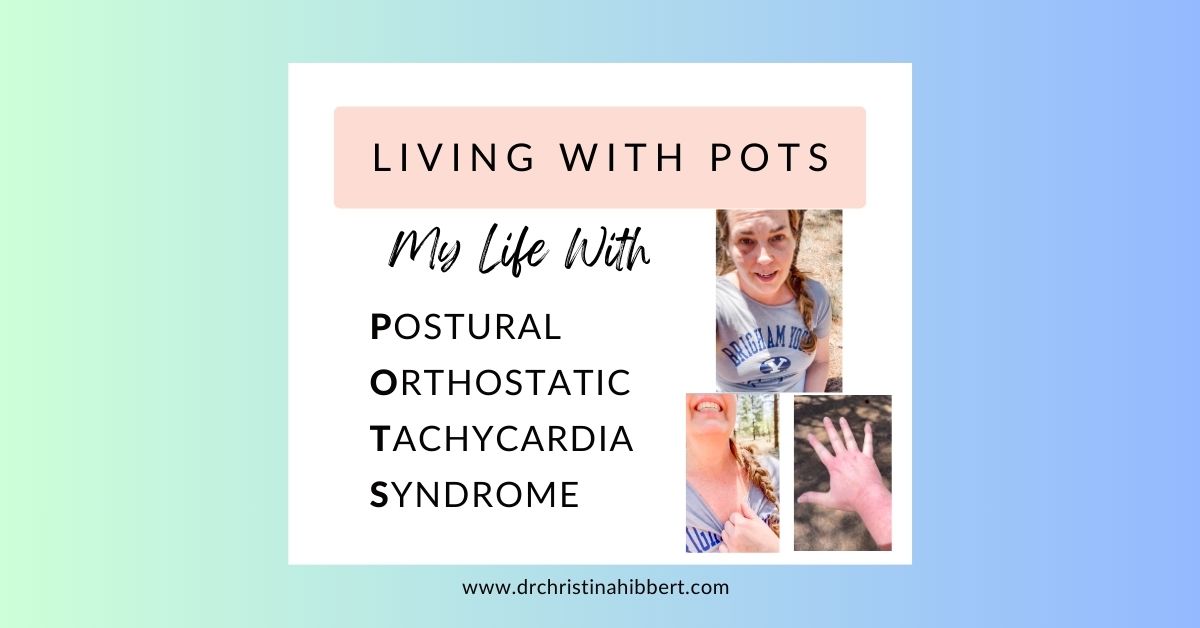Breast cancer isn’t just one traumatic event. It’s a series of traumatic events—a relentless storm that rolls in over months and years, disrupting your body, mind, relationships, and soul.
From the moment of diagnosis to every treatment decision, every scan, every surgery, every complication, every loss—the trauma builds.
It’s no wonder that PTSD is so common among breast cancer survivors.
In fact, one study shows that a staggering 82.5% of breast cancer survivors experience symptoms of post-traumatic stress disorder (PTSD). That’s four of five survivors. That’s one of the highest rates I’ve ever seen for any population.
To put this in perspective, one in five, or 20% of the general population, who experiences a traumatic event, will develop PTSD.
It just goes to show how traumatic breast cancer, treatment, and all that both bring forevermore, can be.
And yet, no one really talks about it.
At least, that’s been my experience. Only one of my original medical team of providers ever mentioned trauma and PTSD, and that was after I told her, “I think I have PTSD” at a follow up visit.
Fortunately for me, I am a clinical psychologist and I specialize in loss, grief, and trauma and health psychology, among other things. I was able to understand that I was being traumatized, name it, and seek my own help for the trauma.
Our 8th attempt to get a “good vein” for my final chemo infusion, Dec 2019.
That doesn’t mean it hasn’t been an ongoing challenge.
Even with my professional background and help, I’ve had to learn to cope with what feels like wave after wave of both iatrogenic (or medical) and psychological trauma. I’m still working on it, nearly years after diagnosis.
Most aren’t as “fortunate” as I am. Most don’t have the background to help them recognize, understand, and seek help for the trauma of breast cancer.
In my experience, too many women don’t even know they’ve been traumatized. No one has ever told them.
I’ve heard from so many cancer sisters online, “Why did no one ever tell me I was traumatized?”
Thus, most do not get the help they deserve and so desperately need.
Prepared for the Physical, not the Mental-Emotional
We go into breast cancer knowing we have to fight physically. We gather our medical team, choose our treatments, prepare for chemo, surgery, radiation. We brace ourselves for the physical pain and possible side effects.
But we simply aren’t prepared for the emotional wreckage it all leaves behind.
Why don’t we make a complete mental-emotional-social-spiritual treatment plan as we create our physical one?
Why don’t most of our providers even say something as simple as, “This will likely be an extremely challenging time for you mentally and emotionally. It will be tough on your relationships. It may challenge your spiritual sense of self”?
I think too many providers are afraid that talking about potential trauma from breast cancer treatment will somehow make it harder for their patients to cope with the already strenuous physical demands.
In fact, the opposite is most usually true.
The more we talk about what challenges lie ahead, the better prepared we can be to face them.
Talking about possible trauma enables us to mentally prepare, to gather our support system, to connect with mental health providers and to potentially begin the work of healing, even while we’re experiencing the traumatic events.
The truth is: when treatment is harsh on the body, it’s equally as harsh on the mind, on the heart, on our relationships, and on our spirit.
No one tells us this.
No one says, “By the way, you’re about to go through one of the most traumatic things a human being can experience.”
There’s no “breast cancer patient/survivor roadmap.”
There’s no roadmap for how to deal with a breast cancer diagnosis, treatment, and survivorship.
There’s no roadmap for coping with the grief of losing your breasts, your fertility, your sense of safety and innocence, or your identity.
There’s no manual for rebuilding after your body has been rearranged, reconstructed, and left with scars inside and out.
After I lost both my breast reconstruction implants to infections, right after chemotherapy, just beginning to understand the trauma of it all.
The physical toll…
I had a double mastectomy—a double amputation.
Then came chemo (and cold-capping to save my hair), breast reconstruction, a BRCA1 diagnosis and hysterectomy, and the infections, “rare” occurrences, and complications. Somany complications, resulting in 15 total surgeries. Parts of my body were removed, transplanted, switched around, and destroyed.
And now? I’m missing parts of myself.
If that isn’t trauma, I don’t know what is.
When cancer triggers old wounds…
When medical trauma—also known as iatrogenic trauma—hits, it doesn’t exist in a vacuum. It slices deeper than skin, right into the pain and trauma we’ve already endured. It unearths the trauma that’s been buried in our flesh, organs, and bones.
For me, it unearthed the grief of losing my two sisters—one to suicide, the other to cancer. It brought back the losses of dear friends to suicide and cancer, and the pain of watching my brother-in-law die of cancer, too.
So much death. So much loss.
Breast cancer didn’t just add to the trauma—it amplified it.
It carved into wounds I thought had long since scarred over.
When treatment ends and trauma begins…
Then one day, someone tells you: “You’re done! Treatment’s over!”
And you’re left wondering:
Wait… what just happened?Where did everyone go?Why am I so traumatized?
When the surgeries are done, when the chemo ends, when you ring that bell, when they say “you’re done”…
It’s SO not over.
While everyone else celebrates, you’re left in the ashes of what you survived—unsure how to even begin to rebuild.
That’s the part no one prepares you for. That’s the part we have to talk about.
With my dear friend, Minae, just after her son left for his mission, just weeks before she died. One of the most courageous things I’ve ever witnessed.
We have to start the conversation.
We have to be the ones to initiate the breast cancer trauma conversation, simply by saying truths like:
“Breast cancer is traumatic.”
“I’ve been traumatized through breast cancer treatment.”
“I think I may have PTSD (or depression, or anxiety...).”
And we need to keep this conversation going.
Because as we each share our experiences with the trauma of amputations and chemo and radiation and lost parts of ourselves and relationships fallen by the wayside, we give others permission to do the same.
We give others a voice, so that they too can boldly proclaim: “I have survived cancer! AND it’s taken a heavy toll.”
Only once we can admit that we are hurting can we then choose to seek out the help we need to clean up the aftermath of the war.
Watch my “Breast Cancer Trauma & PTSD” talk here.
Cleaning up the trauma aftermath…
There are so many ways we can begin the trauma healing process.
Of course, we can begin with self-help through journaling, talking to trusted loved ones, movement, and yes, allowing ourselves to feel what we feel and grieve our losses.
But most of the time, trauma requires professional help.
I started psychotherapy the week after my diagnosis. I’m still in therapy.
I’ve done various kinds of trauma therapy, including somatic therapy, cognitive-behavioral, internal family systems (IFS) and EMDR.
I’ve done several rounds of ketamine-assisted therapy, which enabled me to access the deepest trauma I couldn’t seem to get to on my own.
I’m doing the work.
I’m taking ownership of my mental and emotional healing. I’m repairing the relationships that are worth repairing. I’m continuing my spiritual healing through faith, prayer, and a whole lot of grace.
The mental-emotional-social-spiritual health sides of breast cancer are no joke.
And the trauma doesn’t heal with time alone.
It requires help.
It requires support.
It requires treatment.
If you relate, if you’re going through this, too, please—reach out for help.
Let me be the one to say…
“I’m so sorry you’ve had to go through this.”
“You’ve probably been traumatized by it all.”
“Most of us are impacted by the trauma of breast cancer to a significant degree.”
“You don’t have to carry this trauma forever.”
“You don’t have to figure it out on your own.”
“You are not broken. You are wounded. You are human, and you’ve been hurt beyond words.”
And you are not alone.
Help is available–please seek it.
With time, and help, and trauma work, and grace, we each may one day be healed.
Tell us about your experience by sharing a comment, below. What do you wish had been said/done for you? What has helped you identify, treat, and heal from the trauma?
Dr. Christina Hibbert is a clinical psychologist, author, speaker, breast cancer & chronic illness warrior, and advocate for mental health in survivorship. Learn more or connect here on this site, or through Instagram, Facebook, TikTok, or YouTube.
*While it’s challenging to pinpoint an exact percentage, studies indicate that a significant portion of breast cancer survivors experience PTSD symptoms. Some studies have found that between 20% and 80% of breast cancer patients may experience PTSD-like symptoms, and a smaller percentage, typically around 3-4%, meet the full diagnostic criteria for PTSD. A study reported that 82.5% of women with early-stage breast cancer had PTSD symptoms, but only 3.6% received a full PTSD diagnosis. [1, 2]
**Most newly diagnosed patients with BC experience PTSD symptoms, whereas full diagnoses of DSM-IV stress disorder are rare. Symptoms diminish somewhat within 1 year furthered by university education but independently from mastectomy and chemotherapy. Throughout the year after diagnosis, having BC entails markedly increased PTSD symptom burden. Copyright © 2016 John Wiley & Sons, Ltd.
- Varied Prevalence: The prevalence of PTSD among breast cancer survivors varies depending on the methods used to assess PTSD (e.g., self-report questionnaires vs. structured clinical interviews) and the timing of the assessment (e.g., immediately after diagnosis vs. years later). [3, 3, 4, 4]
- Symptom-Based vs. Diagnostic: Some studies focus on PTSD symptoms, which can be more common, while others focus on the full diagnostic criteria for PTSD, which are less common. [1, 1, 4, 4]
- High Incidence of Symptoms: Studies suggest that a large percentage of breast cancer survivors, even if they don’t meet the criteria for PTSD, experience symptoms such as intrusive thoughts, nightmares, and hyperarousal. [1, 1, 2, 2, 5, 6]
- Factors Influencing PTSD: Risk factors for developing PTSD in breast cancer survivors include a history of childhood trauma, non-white ethnicity, obesity, younger age at diagnosis, higher-stage breast cancer, and shorter time since treatment. [4, 7, 7, 8]
[1] https://www.cancer.gov/about-cancer/coping/survivorship/new-normal/ptsd-hp-pdq
[2] https://www.breastcancer.org/research-news/many-women-have-ptsd-symptoms-after-dx
[3] https://pmc.ncbi.nlm.nih.gov/articles/PMC5676567/
[4] https://www.ncbi.nlm.nih.gov/books/NBK65728/
[5] https://www.sciencedirect.com/science/article/abs/pii/S1462388924002746
[6] https://pubmed.ncbi.nlm.nih.gov/7826934/
[7] https://acsjournals.onlinelibrary.wiley.com/doi/full/10.1002/cncr.32934

